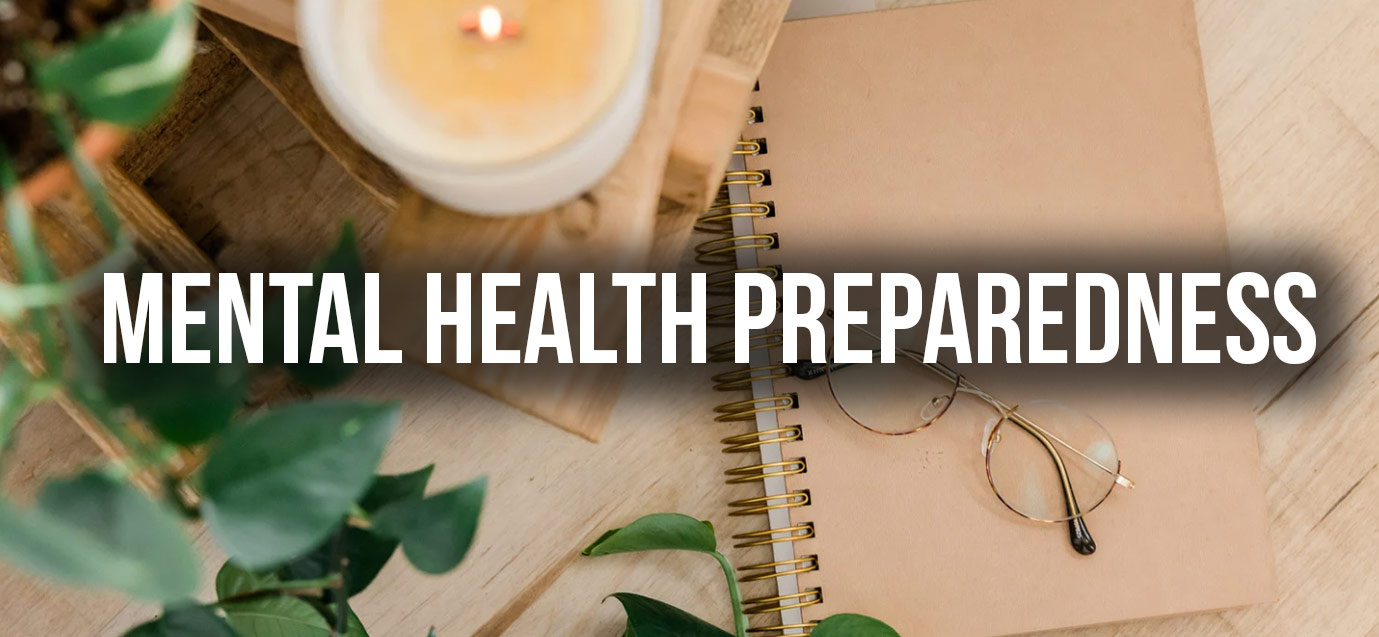
Mental Health Preparedness
Tuesday October 10, 2023
Mental Health Preparedness: A Guide to Nurturing Resilience and Well-being
October 10, 2023, is World Mental Health Day. Raising awareness around the topic of mental health can make a difference in your life as well as those around you.
Support, knowledge, and resources are all important factors when it comes to facilitating positive mental health practices.
Mental health preparedness is as crucial as physical preparedness in today's fast-paced and challenging world. Like stocking up on emergency supplies and planning for disasters, it's essential to prioritize and protect our mental well-being.
In this article, we will explore what mental health preparedness entails and provide practical tips to help you build resilience and maintain good mental health.
Mental health preparedness involves taking proactive steps to ensure your psychological well-being, cope with life's stressors, and respond effectively to mental health challenges. It's not just about reacting to crises; it's about building the mental resilience needed to navigate the ups and downs of life successfully.
Practicing positive mental health habits can better prepare you in case of emergencies and disasters.
After disaster strikes, it's easy to let stress take over. Take steps to mentally prepare for potential risks and emergencies.
Key Components of Mental Health Preparedness
1. Self-awareness: The foundation of mental health preparedness is understanding your own emotional and psychological needs. Regular self-reflection can help you identify triggers, recognize signs of distress, and develop self-compassion.
2. Stress management: Learn effective stress management techniques such as mindfulness, deep breathing, exercise, and time management. These tools can help reduce the impact of stressors on your mental health.
3. Social support: Cultivate a strong friends and family support network. Having someone to talk to and lean on during challenging times can significantly impact your mental well-being.
4. Resilience building: Resilience is the ability to bounce back from adversity. To enhance your resilience, develop problem-solving skills, learn from failures, and practice optimism.
5. Professional help: If you are facing severe mental health challenges, don't hesitate to seek professional help. Mental health professionals can provide therapy, medication, and support tailored to your specific needs.
Practical Tips for Mental Health Preparedness
1. Prioritize self-care: Dedicate time for self-care activities such as exercise, meditation, hobbies, and adequate sleep. These practices can boost your mood and reduce stress.
2. Build a routine: Establishing a daily routine can provide structure and stability, especially during times of uncertainty.
3. Set boundaries: Learn to say no when necessary to avoid overextending yourself. Boundaries protect your mental and emotional well-being.
4. Foster positive relationships: Invest time in nurturing healthy relationships with friends and family members supporting your mental health goals.
5. Practice gratitude: Regularly express appreciation for the positive aspects of your life. Gratitude can enhance your overall sense of well-being.
6. Monitor your mental health: Keep an eye on your mental well-being as you would monitor your physical health. If you notice persistent changes in mood or behavior, seek help.
7. Learn stress management techniques: Explore stress reduction methods like mindfulness, progressive muscle relaxation, or journaling to manage everyday stressors effectively.
8. Seek professional guidance: If you experience symptoms of mental illness, don't hesitate to consult a mental health professional. Early intervention can be the key to recovery.
9. Stay informed: Educate yourself about mental health issues, the available resources, and local crisis hotlines. Being informed can help you assist others in need as well.
10. Encourage open conversations: Promote mental health awareness by talking openly about it with friends and family. Reducing the stigma around mental health can encourage others to seek help when needed.
Mental health preparedness is a crucial aspect of overall well-being. By proactively taking steps to enhance your mental resilience, manage stress, and seek support, when necessary, you can build a strong foundation for a happier and healthier life.
Remember that mental health is a lifelong journey, and investing in it is an investment in your future well-being and quality of life.